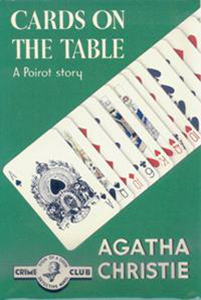“Cards on the Table” (1936) starts with a weird premise and a weird hobby: A socialite, Mr. Shaitana, likes to throw parties where he invites people he suspects of having gotten away with murder, just to see their reactions when he says something telling. Additionally, the novel is about bridge, a game of which I am unfamiliar with the details.
I briefly worried that this would be like “The Big Four” – the weakest Agatha Christie book I’ve read to this point, one where I never got on the author’s wavelength. But “Cards on the Table” ends up being one of my favorite Hercule Poirot novels.
Bridge to a solution
The unlikely setup leads to a delicious mystery and fascinating character interplay. After Shaitana is found stabbed to death in a room with four bridge players, Poirot – part of a team effort with three other sleuths (all of whom were in the adjacent room!) – investigates the four suspects’ backgrounds to find out 1, if they indeed murdered someone in the past, and 2, what their method was.

“Cards on the Table” (1936)
Author: Agatha Christie
Genre: Mystery
Series: Hercule Poirot No. 14
Setting: London, 1936
Everyone has the same motive (to silence Shaitana), but the character traits of the suspects will be the key to solving this one just as much as the clues.
Among the team of four detectives is murder-fiction scribe Mrs. Ariadne Oliver. Christie cheekily writes this author as a successful hack who messily chows down on apples and openly admits the plot of every one of her books is identical but no one has called her out on it.
I’m not sure if Christie is letting us in on a trade secret, being self-deprecating, or making fun of lesser writers. But she obviously has fun sneaking some commentary on her own craft into her books, having also used a sloppy hack writer in “Death in the Clouds.”
Strong character roster
At any rate, if all Christie’s books use the same plot the way Oliver’s do, she has me fooled. Indeed, “Cards” is one of the most creative and fun, not only for Poirot’s character-based angle toward the solution but because of great character writing all around.
The sleuthing side is rounded out by Scotland Yard’s Superintendent Battle, who gives off an initial air of being stupid and slow but who always reaches the correct solution, and Colonel Race, who is simply a runner for Battle, traveling to Africa to research a suspect’s past.
The suspects include Dr. Roberts, who would know how to stab someone quickly and lethally, but who would be more likely to use poison; Major Despard, a man of the world who would be brazen enough to pull off the murder; Mrs. Lorrimer, who would be more likely to plan a murder in advance; and young Anne Meredith, a crushingly innocent girl who might act opportunistically.

Poirot learns these traits in part by their bridge games. As a non-player, I didn’t get every detail, but I got the gist of Poirot’s thought process.
Page-turning finale
Another strength of “Cards” is the ending, and the brisk march toward it in the final act. This is a rare Christie novel that uses not merely red-herring suspects, but outright uses false endings, in the sense that the killer is “revealed” but then there’s more to it – as we know because we’re 30 pages shy of the last page.
The twists are a blast as Christie impressively gets tons of suspense and intrigue out of a mere four suspects. The conclusion also boasts more physical action than usual – another thing reminiscent of “The Big Four” but done much better here.
I always question the logic of someone committing a murder that by the nature of its time and location puts him/her on the suspect list, something “Cards” has in common with Christie’s transportation novels such as “Murder on the Orient Express,” “Death on the Nile” and “Death in the Clouds.” But it does effectively narrow the focus of the whodunit aspect, so I’m not complaining.
And it’s great that Poirot steps to the fore by the end, after the book starts in an unorthodox fashion where he’s merely one of four detectives, rather than the acknowledged star of the team. Christie has fun with Mrs. Oliver for one delightful chapter, and Battle is at the top of his game, but in the end Poirot has the answers.
It’s one of the few things in “Cards on the Table” that isn’t a surprise.
Every week, Sleuthing Sunday reviews an Agatha Christie book or adaptation. Click here to visit our Agatha Christie Zone.

